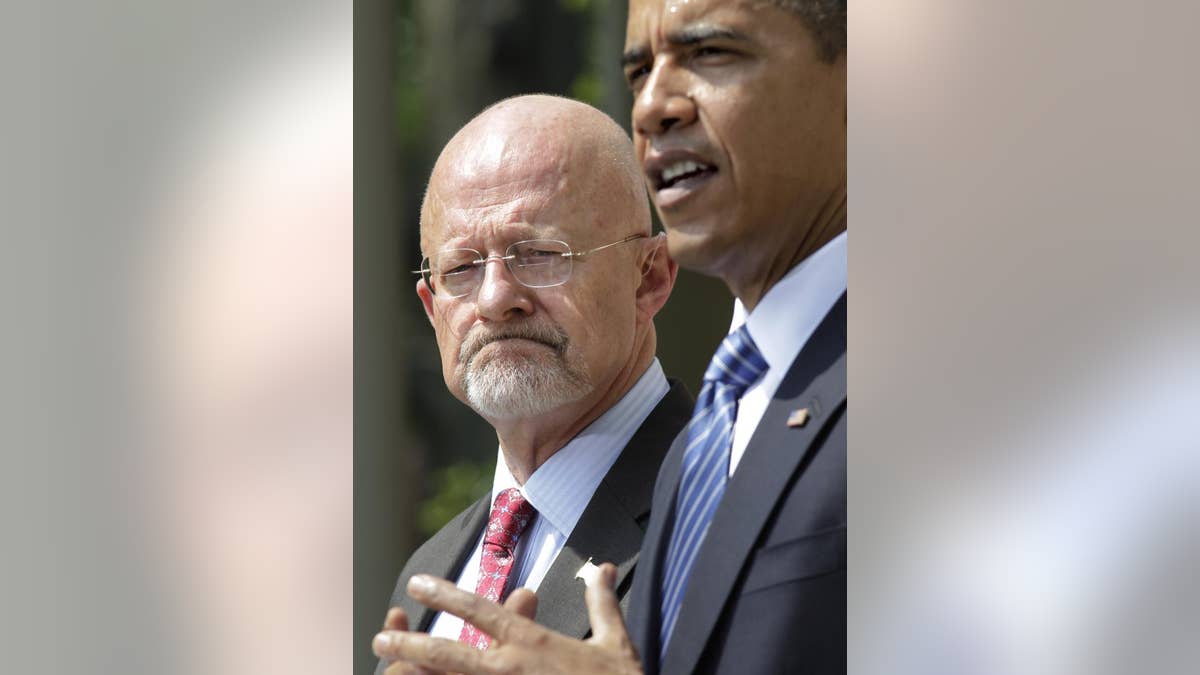
In this June 5, 2010, photo, President Barack Obama announces James Clapper, left, as Director of National Intelligence in Washington. (AP Photo)
The man in charge of boosting information sharing in a post-9/11 world suggested on Wednesday that information sharing may need to be scaled back, strongly criticizing some of his own employees for recent media leaks and saying President Obama has expressed "great angst" over the issue.
"There's always this dilemma between compartmentation and sharing, collaboration and all that sort of thing," Director of National Intelligence James Clapper said in Washington. "But I'll tell you, in this day in age with the hemorrhage of leaks in this town, I think compartmentation -- appropriate, reasonable compartmentation -- is the right thing to do."
Clapper said that despite information sharing initiatives across the country, the "classic dilemma" of "need to share" versus "need to know" is "still with us."
He said episodes like the recent release of nearly 80,000 secret military documents by the whistleblower website WikiLeaks will "have a very chilling effect on the need to share." The documents released by WikiLeaks in July dealt with the ongoing war in Afghanistan.
Speaking about intelligence reform during an event organized by former members of the 9/11 Commission, Clapper recounted a meeting with President Obama the day before.
"I was ashamed to have to sit there and listen to the president express his great angst about the leaking that's going on here in this town, particularly when it's widely quoted, amorphous, anonymous senior intelligence officials who for whatever reason get their jollies from blabbing to the media," Clapper said. "I am criticizing the people who are allegedly government officials in responsible positions who have supposedly taken an oath to protect this country, and as the president remarked, the irony here is people engaged in intelligence who turn around and talk about it publicly."
Clapper, meanwhile, noted that the U.S. government is "improving information sharing" through state, local and tribal organizations, including the 72 so-called "Fusion Centers" across the country.
Asked about Clapper's remarks, one intelligence official, who spoke only on the condition of anonymity, said Clapper was simply saying "there is some information that you have to protect, and sometimes that includes limiting the number of people who get it."
The Office of the Director of National Intelligence was created by Congress after the 9/11 attacks to, among other things, "mobilize a new, integrated Intelligence Community (IC) workforce and eliminate barriers to information sharing," according to materials posted on the DNI's website.
Several months ago, a White House official acknowledged at the time "an honest difference of view" among federal agencies "regarding what information needed to be shared broadly and publicly."
According to several other officials at the time, the White House took the unusual step of wading into a dispute between the FBI and Department of Homeland Security. Tensions were aired during a weekend meeting at the White House, after a "disconnect" reached a "boiling point" during the case of Najibullah Zazi, the Colorado airport shuttle driver who planned to bomb the New York City subway system.
At the meeting, FBI Director Robert Mueller was "angry" and "upset" over leaks to the media, while DHS Secretary Janet Napolitano expressed concern that only limited information was being offered to local authorities, officials said.
On Wednesday, Clapper cited the Zazi case and other recent homegrown plots as part of a "changing threat environment."
"The increasing role of Westerners, including Americans, in Al Qaeda and associated groups increases their knowledge of Western culture and security practices, and enhances their access," Clapper said. "Of course, that obviously raises the potential specter of attack. ...The system, as hard as we work at it, we're simply not going to bat a thousand."
There will be "challenges," he said.




